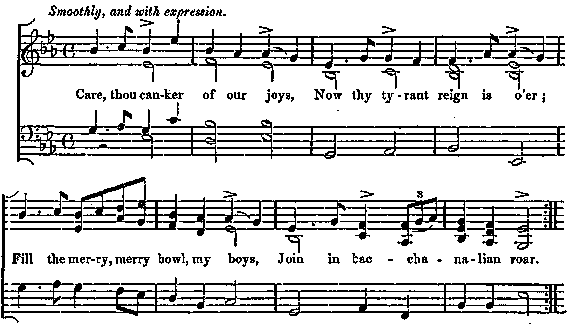Popular Music Of The Olden Time Vol 2
Ancient Songs, Ballads, & Dance Tunes, Sheet Music & Lyrics - online book
| Share page | Visit Us On FB |
|
|
||||
|
REIGN OF QUEEN ANNE TO GEORGE II. |
723 |
|||
|
|
||||
 |
||||
|
|
||||
|
Seize the villain, plunge him in ;
See the hated miscreant dies :— Mirth and all thy train come in,
Banish sorrow, tears, and sighs. |
O'er our merry midnight bowls, Oh! how happy shall we be;
Day was made for vulgar souls, Night, my boys, for you and me. |
|||
|
|
||||
|
I MADE LOVE TO KATE.
There are certain tunes common to England and Scotland, about which the existing evidence is so nearly balanced that it is very difficult to prove to which country they owe parentage. One of these is now commonly known in England as For that's the time o' day, and in Scotland as Wod'd and married and a\
Woo'd and married and a' is a song that was " sung by Mr. Lauder at the little theatre in the Hay Market," and " printed for J. Oswald in St. Martin's Church Yard." After a little touching up, the words were included in Herd's Ancient and Modern Scottish Songs, 1769. The tune was printed by Bremner in the seventh number of his Collection of Scots'1 Heels and Country Dances, and the seventh and eighth numbers are included in a list of new publications in the Scots'" Magazine for November, 1759.
I made love to Kate is the English name, and it is derived from a song " sung by Mr. Beard at Ranelagh." When Tlie Jovial Crew was revived at Covent Garden Theatre (Feb. 14th, 1760), this was so popular that he introduced it at the end of the second act. Johnson, who published " The Airs in The Jovial Crew, or Merry Beggars, as performed at the theatre in Covent Garden," desirous of saving the expense of re-engraving the song, employed the same plate (" sung by Mr. Beard at Ranelagh") in the opera. In so doing, he was obliged to print it out of its proper place, because it would have commenced in the middle of a page. If we suppose this plate to have been only a few months old, the dates will be tolerably balanced.
The tune has the character of the hornpipes, rounds, and jigs of which so many collections were advertised from 1710 to 1760, but which are very difficult to
2 z |
||||
|
|
||||